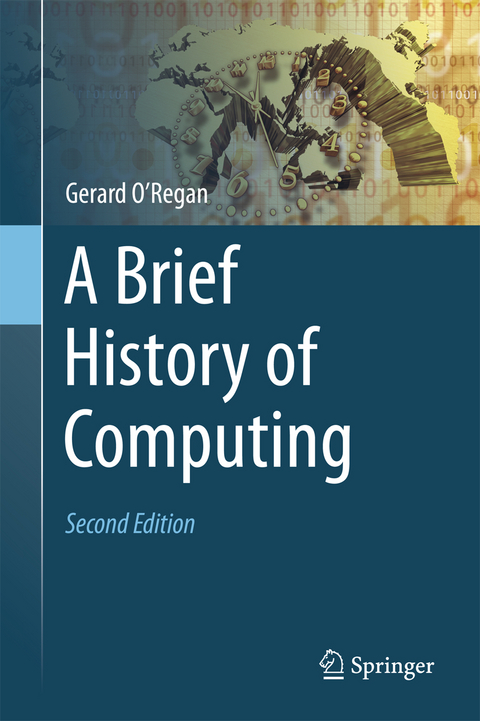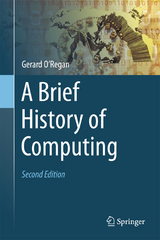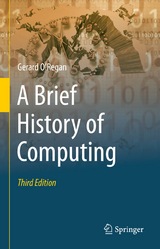A Brief History of Computing
Seiten
2012
|
2nd ed. 2012
Springer London Ltd (Verlag)
978-1-4471-2358-3 (ISBN)
Springer London Ltd (Verlag)
978-1-4471-2358-3 (ISBN)
- Titel erscheint in neuer Auflage
- Artikel merken
Zu diesem Artikel existiert eine Nachauflage
This lively and fascinating text traces the key developments in computation – from 3000 B.C. Topics and features: ideal for self-study, offering many pedagogical features such as chapter-opening key topics, chapter introductions and summaries, exercises, and a glossary;
This lively and fascinating text traces the key developments in computation – from 3000 B.C. to the present day – in an easy-to-follow and concise manner. Topics and features: ideal for self-study, offering many pedagogical features such as chapter-opening key topics, chapter introductions and summaries, exercises, and a glossary; presents detailed information on major figures in computing, such as Boole, Babbage, Shannon, Turing, Zuse and Von Neumann; reviews the history of software engineering and of programming languages, including syntax and semantics; discusses the progress of artificial intelligence, with extension to such key disciplines as philosophy, psychology, linguistics, neural networks and cybernetics; examines the impact on society of the introduction of the personal computer, the World Wide Web, and the development of mobile phone technology; follows the evolution of a number of major technology companies, including IBM, Microsoft and Apple.
This lively and fascinating text traces the key developments in computation – from 3000 B.C. to the present day – in an easy-to-follow and concise manner. Topics and features: ideal for self-study, offering many pedagogical features such as chapter-opening key topics, chapter introductions and summaries, exercises, and a glossary; presents detailed information on major figures in computing, such as Boole, Babbage, Shannon, Turing, Zuse and Von Neumann; reviews the history of software engineering and of programming languages, including syntax and semantics; discusses the progress of artificial intelligence, with extension to such key disciplines as philosophy, psychology, linguistics, neural networks and cybernetics; examines the impact on society of the introduction of the personal computer, the World Wide Web, and the development of mobile phone technology; follows the evolution of a number of major technology companies, including IBM, Microsoft and Apple.
Dr. Gerard O’Regan is a CMMI software process improvement consultant at SQC Consulting, and a visiting lecturer at Limkokwing University of Creative Technology, Malaysia. He is the author of the Springer titles Introduction to Software Process Improvement, Mathematical Approaches to Software Quality and A Practical Approach to Software Quality.
Computing in Early Civilisations.- What is a Computer?- Early Computers.- Developments in the 1950s to 1970s.- Revolutions in the 1980s and 1990s.- IBM.- Technology Companies.- The Internet Revolution.- History of Programming Languages.- History of Software Engineering.- People in Computing.- Foundations (Boole and Babbage).- Claude Shannon.- Alan Turing.- Artificial Intelligence.
| Zusatzinfo | XXIV, 264 p. |
|---|---|
| Verlagsort | England |
| Sprache | englisch |
| Maße | 155 x 235 mm |
| Themenwelt | Sachbuch/Ratgeber ► Natur / Technik |
| Geschichte ► Teilgebiete der Geschichte ► Technikgeschichte | |
| Mathematik / Informatik ► Informatik ► Theorie / Studium | |
| Naturwissenschaften | |
| Technik | |
| Schlagworte | Informatik, Geschichte |
| ISBN-10 | 1-4471-2358-1 / 1447123581 |
| ISBN-13 | 978-1-4471-2358-3 / 9781447123583 |
| Zustand | Neuware |
| Haben Sie eine Frage zum Produkt? |
Mehr entdecken
aus dem Bereich
aus dem Bereich
Buch | Softcover (2024)
Lehmanns Media (Verlag)
CHF 27,90
Digitalisierung neu denken für eine gerechte Gesellschaft
Buch | Hardcover (2023)
Quadriga (Verlag)
CHF 27,95
Vom Perceptron zum Deep Learning
Buch | Softcover (2022)
Springer Vieweg (Verlag)
CHF 27,95





